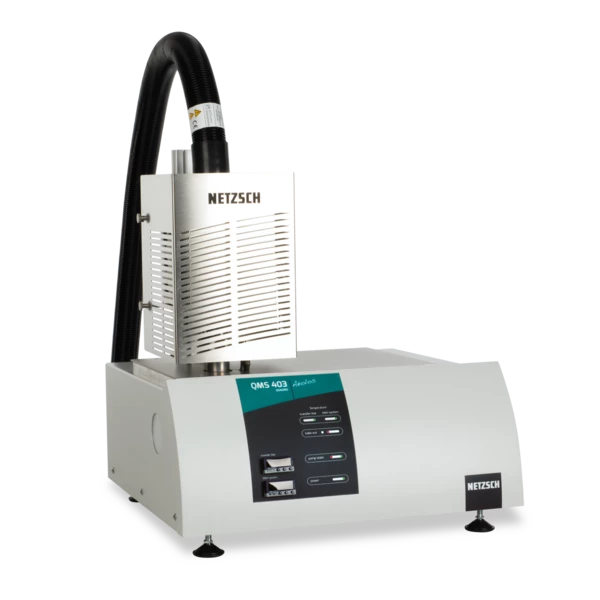The Fleshed-Out Design of the QMS 403 Aëolos Quadro for Coupling to TGA, STA, DSC and DIL Systems
The 403 Aëolos Quadro quadrupole mass spectrometer is a new compact mass spectrometer with a heated capillary inlet system for routine analysis of gases and, in particular, volatile decomposition products of thermal analysis. This system is optimized for coupling to differential scanning calorimeters (DSCs), thermogravimetric analyzers (TGAs) and dilatometers (DILs). The software is unique: fully integrated MS software for measurement and analysis.

Capillary Coupling for Optimized Gas Flow Conditions
- Single-step pressure reduction
- Minimization of cold spots in the entire transfer path of the gases due to an even temperature of 300°C (optionally 350°C)
- Heated chamber for easy handling and precise adjustment of the quartz glass capillary inlet to the QMS
- Flexible, allowing standard thermoanalytical measurements and also simultaneous TGA, MS (GC-MS) and MS-FT-IR measurements
- Very robust and service-friendly while still maintaining high sensitivity (detectable mass loss in the μg-range)
- TGA-MS measurements under humid atmospheres possible
- Hyperbolic quadrupole system with pre-filter for improved transmission in the high mass range and improved sensitivity in the low mass range (e.g., H2, He)
- SEM with discrete dynodes and integrated Faraday cup for high dynamic range and long lifetime
- 3-D presentation of MS and thermal analysis data
- Operation and data evaluation with Proteus software
Sophisticated Heated Transfer System and Single-Step Pressure Reduction for Loss-Free Gas Transport
The high temperature of the gas transfer system and the absence of pressure reduction orifices practically eliminate condensation of decomposition products during thermal analysis experiments. This achieves a high detection sensitivity and facilitates quantitative detection of all identified gas components.
The inlet system with the capillary allows for the investigation of other gas sources independent of the thermoanalytical system.
Design of the NETZSCH Thermal Analyzers
Already from the outset, NETZSCH thermal analysis devices were developed with the possibility of coupling in mind. Over the last 40 years, the gas transport path – which starts at the furnace outlet and progresses via the adapter and capillary up to the QMS inlet – has been considered and optimized at every new phase in development. Today, any gas loss caused by condensation at cold spots has nearly been eliminated; also, very low carrier gas flow rates are sufficient for complete transfer. The minimal dilution of the volatile sample products released results in high detection sensitivity with the TGA/STA/DIL-QMS 403 Aëolos Quadro.

Application Areas of the QMS 403 Aëolos Quadro Coupling
Decomposition
- Dehydration
- Stability
- Residual Solvent
- Pyrolysis
Solid-Gas Reactions
- Combustion
- Oxidation
- Corrosion
- Adsorption
- Desorption
- Catalysis
Composition Analysis
- Polymer Content
- Proximate Analysis
- Binder Burn-Out
- Dewaxing
- Ash Content
Evaporation
- Vapor Pressure
- Sublimation
Technical Data
Vacuum system
Adjustable heating of adapter head
Cathodes/Filaments

Mass range:
1 u to 300 u(*), optionally 512 u, including autotuning
Ion source:
Cross beam El
Detector:
sem with discrete dynodes and integrated Faraday cup
Capillary:
Quartz-glass (max. 300°C), optionally stainless steel (max. 350°C), with supply coil, easily exchangable
Pressure reduction:
Single-step, from 10³ mbar to 5x10-6 mbar, no orifice
QMS measuring modes:
Scan analog, scan bargraph, MID

GET IN CONTACT
Scan the QR-Code with your smartphone
You still have questions and would like to be contacted by our sales department? Would you like to receive a quote for the product? Do you need a poster or brochure for one of our products? Just Scan the QR-Code!

